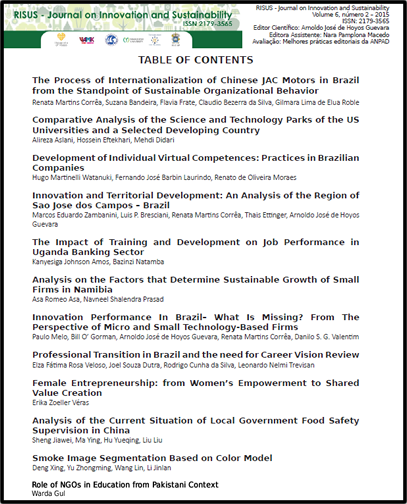The Impact of Training and Development on Job Performance in Ugandan Banking Sector
DOI:
https://doi.org/10.24212/2179-3565.2015v6i2p65-71Keywords:
Training and development, Job performance, Training needs identification, Training methods, Monitoring and evaluation.Abstract
The study examined the impact of training and development on job performance in the Banking sector in Uganda among the selected four banks of Equity Bank, Bank of Africa, Barclays Bank Uganda and Centenary Bank and specifically looked at the relationship between training needs identification, training methods, monitoring, evaluation of training and job performance in the banking sector in Uganda. The study used correlation research design to address the relationship between variables. The study involved managers, heads of departments at each bank and employees. Data was collected using questionnaires to facilitate quantitative approaches in the study. Data was analyzed at three levels that is; univerariate, bi-variate and multi-variate. Univeriate analysis fetched descriptive statistics in form frequencies and percentages while bivariate analysis obtained correlations between variables. At multivariate level a logistic regression model was used to ascertain the magnitude of effect of each independent variable on the dependent variable. Study findings at a bi-variate level revealed a positive and significant relationship between the independent variables (identify training needs, identify training objectives, training content, on the job training technique, off the job training technique, skills application and Knowledge application) and the dependent variable (job performance). At the multi-variate level, it was revealed that all independent variables except knowledge application in the training and evaluation process explain 69% of job performance in the model. It was concluded that identification of training objectives, identification of training objectives and skills application have a positive significant effect on job performance in the banking sector in Uganda. It was therefore recommended that there is need to need to streamline the needs assessment process before the training process, endeavor to clearly define training objectives and have a strict monitoring and evaluation process on trainees.Downloads
Published
2015-08-10
Issue
Section
Papers
License
This Journal is licensed under a Creative Commons Attribution-Non Commercial-No Derivers 4.0 International license.
1.The author (s) authorize the publication of the article in the journal;
2.The author (s) warrant that the contribution is original and unpublished and is not in the process of being evaluated in other journal (s);
3. The journal is not responsible for the opinions, ideas and concepts emitted in the texts, as they are the sole responsibility of its author (s);
4. The editors are entitled to make textual adjustments and to adapt the articles to the standards of publication.


